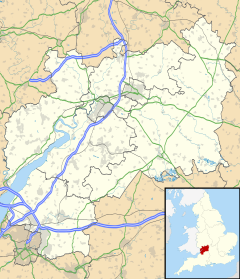Quenington
| Quenington | |
|---|---|
 Knights Hospitallers' Gateway, circa 12th century, Quenington village centre |
|
| Quenington shown within Gloucestershire | |
| Population | 603 (2011 Census) |
| OS grid reference | SP144044 |
| Civil parish |
|
| District | |
| Shire county | |
| Region | |
| Country | England |
| Sovereign state | United Kingdom |
| Post town | Fairford |
| Postcode district | GL7 |
| Dialling code | 01285 |
| Police | Gloucestershire |
| Fire | Gloucestershire |
| Ambulance | South Western |
| EU Parliament | South West England |
Quenington is a nucleated village and larger rural civil parish in the Cotswold district of Gloucestershire, England, on the River Coln 8 miles (13 km) east of Cirencester and 2 miles (3.2 km) north of Fairford. It has a recorded population of 603 people as at the 2011 census.
Important historic buildings include a medieval large dovecote above a gatehouse, and St Swithin's Church of England parish church, built mainly in the late 11th century and (despite partial Victorian restoration) listed in the highest category of listed building, Grade I. The village has a village hall, a pub and a village green. Its economy has been transformed to render agriculture a minor but physically evident employer across most of the area: this area of the Cotswolds has been almost wholly been turned over from forest to agriculture, landscape parks and private or semi-private gardens. The working population divides almost equally into short-distance commuters and working-from-home groups, together accounting for approximately 88% of the working-age population in 2001. A significant minority work in the district's leisure, food and hospitality sector. The Cotswold Water Park lies to the south and the Cotswold scarp is away to the north and west.
The place-name 'Quenington' is first attested in the Domesday Book of 1086, where it appears as Qvenintone. This is from the Old English 'Cwenenatun' meaning 'the women's town or settlement' (the word 'queen' has the same derivation).
It had previously been suggested that the name Quenington could have meant "settlement on the Coln", the river which flows through the village, though the name 'Coln' is of unknown origin. Quenington is mentioned in the Domesday Book in relation to two mills at either end of the village, a water mill and a fulling mill, both now private residences.
John Marius Wilson's Imperial Gazetteer of England and Wales of 1870 describes Quenington as:
...
Wikipedia

